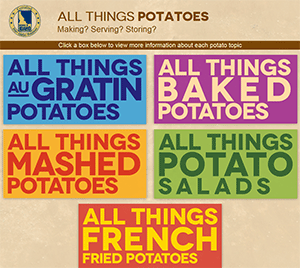Lesson Plan: All Things Potatoes
Tuesday, 17 June 2014 13:27 Potato prep problems? Your students are one click away from the solution. Questions about au gratin, baked, mashed, potato salad and french fries are answered online.
Potato prep problems? Your students are one click away from the solution. Questions about au gratin, baked, mashed, potato salad and french fries are answered online.
Courtesy of the Idaho Potato Commission
Here’s a scenario to offer students: It’s the middle of the dinner rush, and the french fries are coming out of the fryer darker than usual. What’s an operator to do when a potato-preparation crisis arises?
Have them head to the Idaho Potato Commission (IPC) All Things Potatoes page. As the potato industry’s best resource for product information (varieties, handling, storage) and usage (preparation tips and recipes), the IPC collected targeted solutions and recommended recipes for five potato menu standards: All Things Au Gratin Potatoes, All Things Baked Potatoes, All Things Mashed Potatoes, All Things Potato Salads and All Things French Fried Potatoes.
Under each heading, students can browse Dr. Potato’s posts on best practices, optimal outcomes and profitability tips. Scrolling down, the IPC provides technique videos and a wide-ranging selection of recipes in each category. Future plans to expand available topics include hash browns and potato skins.
While students visit https://idahopotato.com/foodservice, have them check out the IPC’s comprehensive recipe database, refer to a helpful size guide and Idaho® potato preparation tips, find answers and solutions to operational and culinary FAQs, or ask Dr. Potato a question.

 The 2013 initiative, which has gained much chef and operator support from states bordering the Gulf of Mexico, continues to strive to ensure sustainability of red snapper, grouper and other fish for sale in foodservice.
The 2013 initiative, which has gained much chef and operator support from states bordering the Gulf of Mexico, continues to strive to ensure sustainability of red snapper, grouper and other fish for sale in foodservice. For those visiting Chicago for this year’s National Restaurant Association Restaurant, Hotel-Motel Show, mouths water and palates yearn for one of the City of Big Shoulders’ culinary claims to fame. And among pies, four take the cake.
For those visiting Chicago for this year’s National Restaurant Association Restaurant, Hotel-Motel Show, mouths water and palates yearn for one of the City of Big Shoulders’ culinary claims to fame. And among pies, four take the cake. The chancellor of Johnson & Wales University tells chefs to follow their passion to achieve success while also becoming agents of change in their industry and careers.
The chancellor of Johnson & Wales University tells chefs to follow their passion to achieve success while also becoming agents of change in their industry and careers. Though not new to the market by any stretch, flatbreads, particularly those that say “global,” are enjoying a revolution. A pastry chef-instructor at Kendall College in Chicago reports on the trend, making the case for need-to-know among culinary-arts and pastry/baking students as they embark on their careers.
Though not new to the market by any stretch, flatbreads, particularly those that say “global,” are enjoying a revolution. A pastry chef-instructor at Kendall College in Chicago reports on the trend, making the case for need-to-know among culinary-arts and pastry/baking students as they embark on their careers.